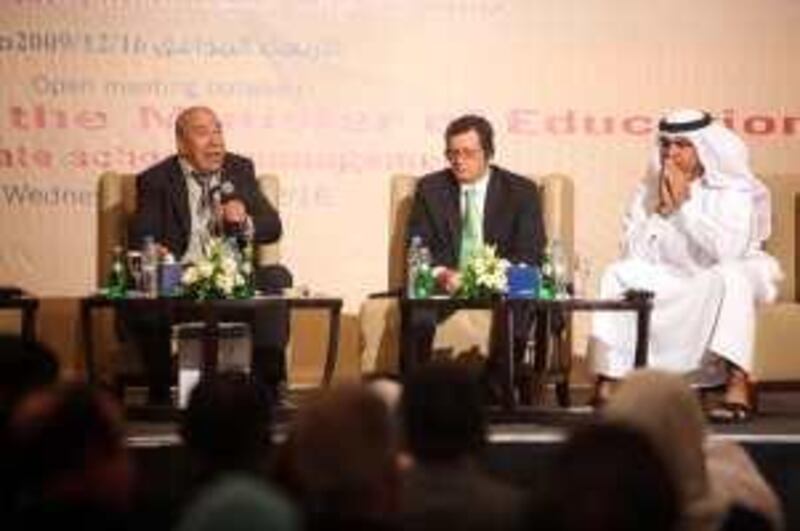Few areas have felt the effects of the rapid population increase in the UAE more than the private-education sector. It has undergone tremendous expansion to accommodate the dramatic growth in expatriate students, nearly all of whom must attend private schools as a result of quotas that limit the number of expatriates allowed in public schools.
For decades, the federal Ministry of Education had full control over public and private schools, and private schools were under limited scrutiny from authorities. But in the past five years, the ministry began to devolve authority to local education bodies, giving emirates greater control over their schools. Now, the tensions are showing. At present, the ministry drafts basic national standards for schools, but local authorities, especially in Abu Dhabi and Dubai, exercise significant regulatory power over local public and private schools.
The Knowledge and Human Development Authority (KHDA) largely took over responsibility for Dubai's private schools in 2006, and its new school-inspection scheme is the first effort in the Emirates to assess quality in private schools. Since school inspections were launched in the past year, unrest has been growing within the private sector in Dubai, opening a rift between school owners and the KHDA. Schools complained about both the terms and process of the inspections, and particularly about new rules that tied fee increases to grades awarded by inspectors.
Dr Carlo Ferrario, headmaster of Dubai College, one of the country's most prestigious high schools, resigned in October, citing government interference in school operations and changes to the educational "landscape" in Dubai as the reasons for his departure. Abu Dhabi begins school inspections this year, and some school owners are wary. "They want to raise standards to an international level," said the principal of one Abu Dhabi school who wished to remain anonymous.
"But they cannot expect the same standards from all schools," he said, adding that schools catering to low-income communities could not be expected to have the same facilities as schools that charge tens of thousands of dirhams a year. During a meeting convened yesterday by the Ministry of Education in Dubai, representatives from the private-education sector called for more involvement in the creation of rules and regulations that govern their own operations.
"There is no understanding between the Ministry of Education, the KHDA and private schools," said Ayman Zeidan, the academic director of the International Academic School in Dubai. "Everybody is working on their own. They don't have common priorities for the country. They need more meetings to create some sort of common base." Ahmed Zakaria, principal of Al Manara School in Abu Dhabi, said: "There should be a connection between the private schools and the educational zones so that they do not surprise us with decisions. School principals, academics and co-ordinators, the ones who have been in the field for 25 years, are more knowledgeable about what's going on and what problems the schools suffer from."
This means that a body created for such a purpose must have real policy-making teeth, said Mr Zakaria. Local education councils like those in Abu Dhabi and Dubai, Mr Zakaria says, rely too heavily on the opinions of foreign experts and consultants. Involving private schools in their own governance, said Nada Saab, the principal of Al Dhafra Private School in Abu Dhabi, would streamline the process.
"Private schools that have been here in the country for a long time should have a say in decision-making and the activities that take place," she said. Among private school operators, the issue of fee increases remains among the most contentious. Many owners feel their rates should not be subject to regulation. Others suggest that older schools remain at a disadvantage because a new institution can set its opening rates at higher levels.
"There is a wide gap in fees between schools," said Ahmed al Manasrah, principal of the International Private School in Abu Dhabi. "You cannot address the needs of the teacher and the student at an old school if you depend on old, mediocre fees, as opposed to the newer schools that have higher fees even though they do not have the experience of the old schools." Mr Manasrah stressed that the Ministry of Education should be in charge of everything, including fee caps.
Ministerial involvement, some said, would also encourage measures to promote "national spirit" in private schools. "The other important issue is that in the middle of these foreign education systems, we should not forget to promote subjects like Arabic, Islamic and social studies, so that the student does not forget his Arabic, Islamic, national origins," said Saleh Fadel, assistant manager of the Al Ain American School.
Mr al Manasrah added that closer collaboration between private schools and the ministry should also include subsidies for private schools to improve their facilities. "We always concentrate on the performance of the teacher, the student, using new education technologies, labs, et cetera," he said. "This needs new buildings and talent. I call on the ministry of education to aid, even in a financial way, private schools."
Richard Forbes, the director of marketing and communications for Global Education Management Systems, the largest operator of private schools in the UAE, said help was needed for schools not doing well. "It is all very well saying that we want to drive the weak providers out of the market but the truth is that there won't be a solution to schooling those who can afford least unless there is either an incentive to invest, or government intervention to help," he said. "It is hard to see what new private investment can be persuaded to go into schools that can only ever add small percentage rises on top of historically low prices.
"We need to discuss this more because, currently, the alternative to 'weak schools' for those most needy looks to be like it will be 'no schools' and that's not an improvement." klewis@thenational.ae kshaheen@thenational.ae







